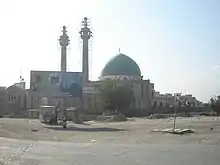| Part of a series of articles on |
| Religion in Afghanistan |
|---|
 |
| Majority |
| Sunni Islam |
| Minority |
| Historic/Extinct |
| Controversy |

Shia Islam in Afghanistan is practiced by a significant minority of the population. According to a PEW 2021 survey, 7% of Afghans followed Shia Islam,[2] but other estimates have put the number as high as 35%.[3][4][5] Afghanistan's Shia are primarily the Twelvers, while a minority are Ismailis.
Twelvers
The majority of Afghanistan's Shia Muslim's are the Twelvers, primarily of the Hazara ethnicity. The next-largest Twelvers are the Farsiwan of the western Herat and Farah provinces. Other, far smaller, Afghanistan's Twelver communities include the Qizilbash and the Sadat populations.
Ismailis
The Ismailis in Afghanistan except Badakhshan almost 90% belong to the ethnic of Hazara community and 2% to the Tajik ethnic. The Ismailis in Badakhshan entirely belong to Tajik ethnic. Hazarajat is however mainly Ismailis.[6]
Baghlan Province is also home to an Ismaili community, the Sayeds of Kayan. Their leader is Sayed Mansur Naderi and his son, Sayed Jaffar Naderi.[7] During the Soviet–Afghan War, about 10,000 Ismaili militiamen defended the Baghlan Ismaili stronghold of Kayan. They struck a deal with the Soviets in not attacking them, but logistically supported the Mujahideen.[8] In 2003 it was reported that unlike other Ismaili communities in the region and worldwide, the Baghlan Ismailis did not defer to the spiritual leader of Ismailis worldwide, the Aga Khan.[7]
See also
References
- ↑ Hashimi, Zar (2010-06-22). "Masjid Jame, Kabul | Zar Hashimi". Flickr. Retrieved 2016-11-28.
- ↑ "Chapter 1: Religious Affiliation". The World’s Muslims: Unity and Diversity. Pew Research Center's Religion & Public Life Project. August 9, 2012. Retrieved 4 September 2013.
- ↑ "Country Profile: Afghanistan" (PDF). Library of Congress Country Studies. August 2008. Archived from the original (PDF) on 2005-02-26. Retrieved 2010-09-03.
- ↑ "Afghanistan". Central Intelligence Agency. The World Factbook. Retrieved 2010-09-03.
- ↑ Waheed Massoud (6 December 2011). "Why have Afghanistan's Shias been targeted now?". BBC News. Retrieved 4 October 2016.
- ↑ Tajjdin, Mumtaz Ali. "Ismailis of Afghanistan". ismaili.net. Retrieved 2023-09-13.
- 1 2 Hindokosh, May 2003. Cited in "Afghanistan: Information on activities of Ismailis loyal to Sayed Kayan". United States Bureau of Citizenship and Immigration Services. 7 July 2004. Archived from the original on 2016-03-12.
- ↑ Michael V. Bhatia; Mark Sedra (2008). Afghanistan, Arms and Conflict: Armed Groups, Disarmament and Security in a Post-War Society. Psychology Press. pp. 252–. ISBN 978-0-415-45308-0. Retrieved 30 March 2011.